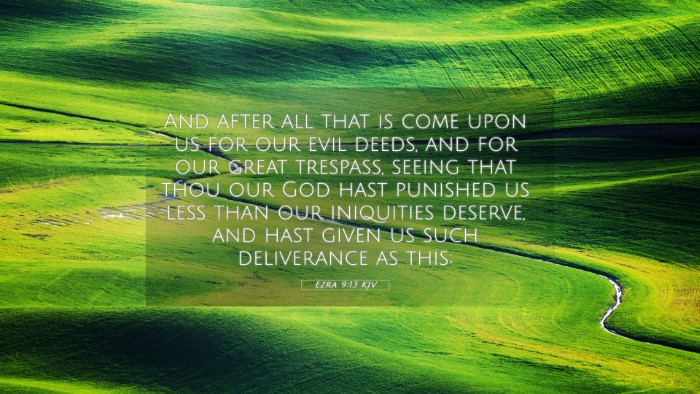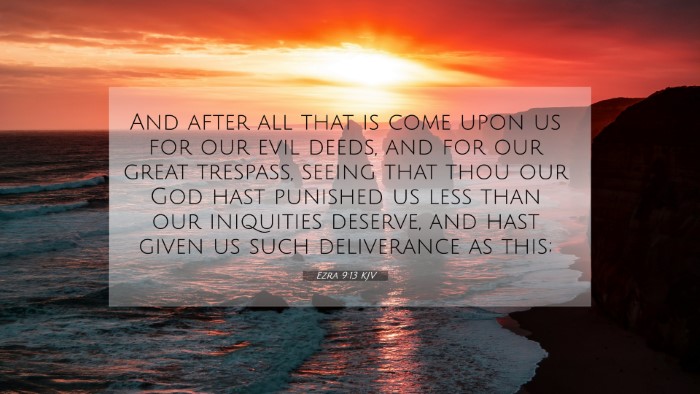Old Testament
Genesis Exodus Leviticus Numbers Deuteronomy Joshua Judges Ruth 1 Samuel 2 Samuel 1 Kings 2 Kings 1 Chronicles 2 Chronicles Ezra Nehemiah Esther Job Psalms Proverbs Ecclesiastes Song of Solomon Isaiah Jeremiah Lamentations Ezekiel Daniel Hosea Joel Amos Obadiah Jonah Micah Nahum Habakkuk Zephaniah Haggai Zechariah MalachiEzra 9:13 Similar Verses
Ezra 9:13 Cross References
And after all that is come upon us for our evil deeds, and for our great trespass, seeing that thou our God hast punished us less than our iniquities deserve, and hast given us such deliverance as this;
Uncover the Rich Themes and Topics of This Bible Verse
Listed below are the Bible themes associated with Ezra 9:13. We invite you to explore each theme to gain deeper insights into the Scriptures.
Ezra 9:13 Cross Reference Verses
This section features a detailed cross-reference designed to enrich your understanding of the Scriptures. Below, you will find carefully selected verses that echo the themes and teachings related to Ezra 9:13 KJV. Click on any image to explore detailed analyses of related Bible verses and uncover deeper theological insights.
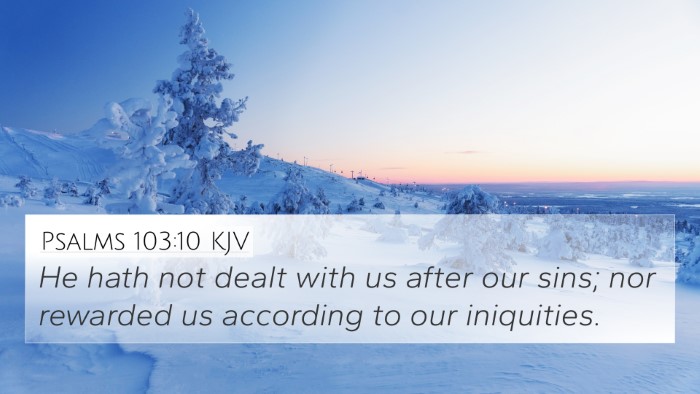
Psalms 103:10 (KJV) »
He hath not dealt with us after our sins; nor rewarded us according to our iniquities.
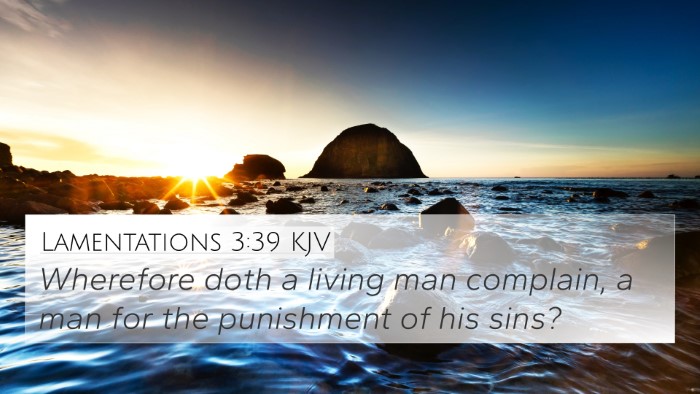
Lamentations 3:39 (KJV) »
Wherefore doth a living man complain, a man for the punishment of his sins?
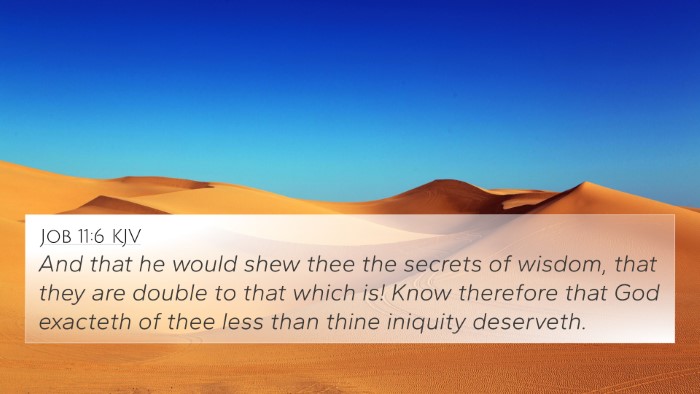
Job 11:6 (KJV) »
And that he would shew thee the secrets of wisdom, that they are double to that which is! Know therefore that God exacteth of thee less than thine iniquity deserveth.
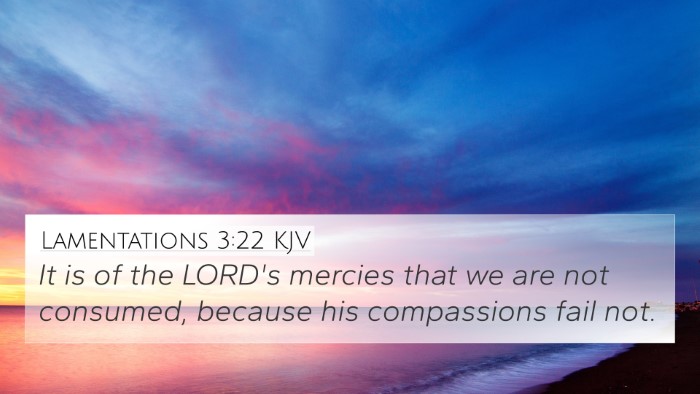
Lamentations 3:22 (KJV) »
It is of the LORD's mercies that we are not consumed, because his compassions fail not.
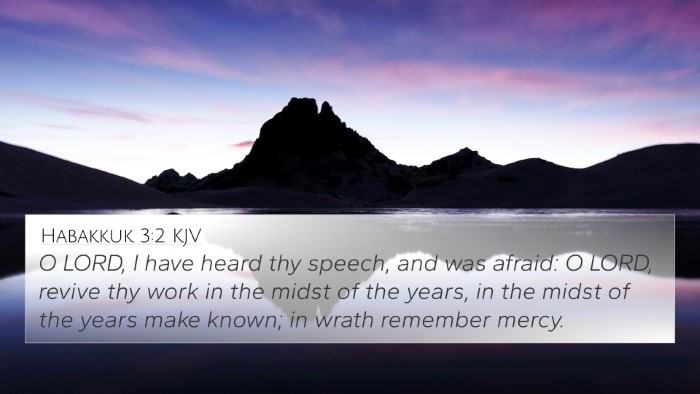
Habakkuk 3:2 (KJV) »
O LORD, I have heard thy speech, and was afraid: O LORD, revive thy work in the midst of the years, in the midst of the years make known; in wrath remember mercy.
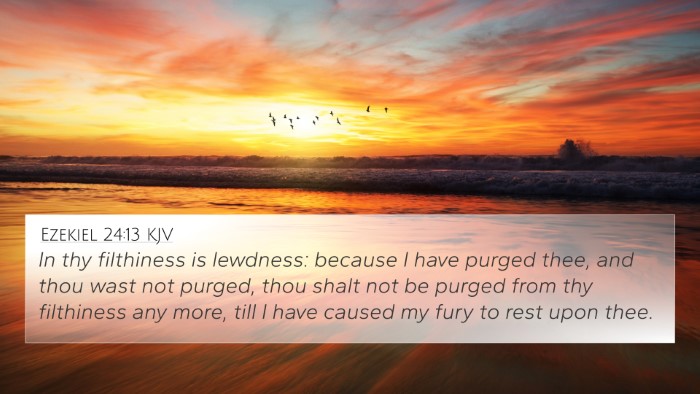
Ezekiel 24:13 (KJV) »
In thy filthiness is lewdness: because I have purged thee, and thou wast not purged, thou shalt not be purged from thy filthiness any more, till I have caused my fury to rest upon thee.
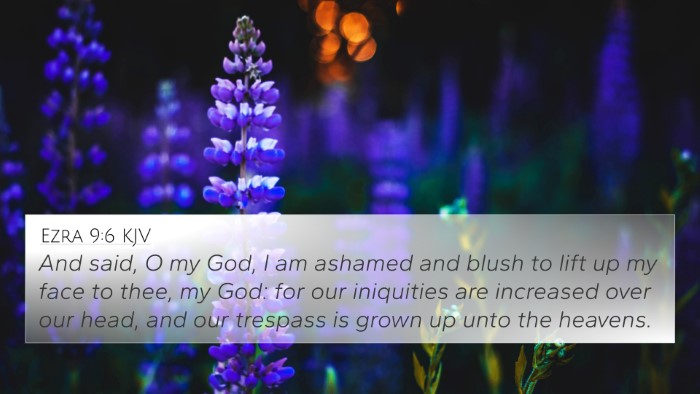
Ezra 9:6 (KJV) »
And said, O my God, I am ashamed and blush to lift up my face to thee, my God: for our iniquities are increased over our head, and our trespass is grown up unto the heavens.
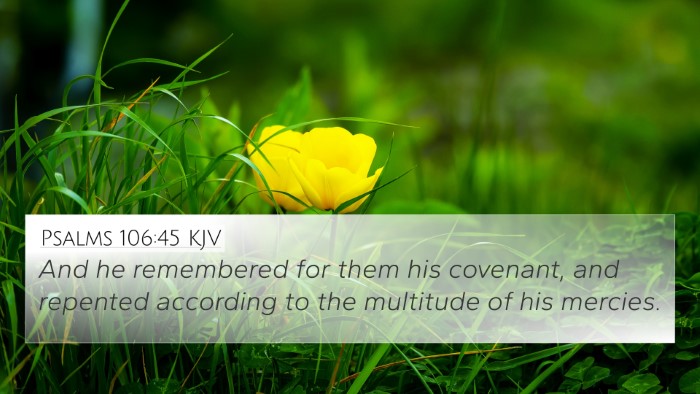
Psalms 106:45 (KJV) »
And he remembered for them his covenant, and repented according to the multitude of his mercies.
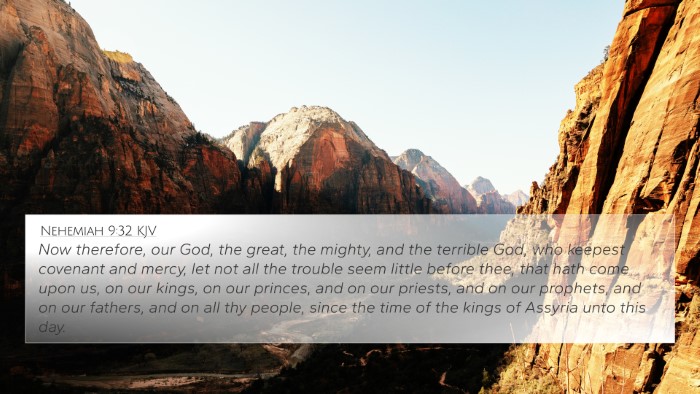
Nehemiah 9:32 (KJV) »
Now therefore, our God, the great, the mighty, and the terrible God, who keepest covenant and mercy, let not all the trouble seem little before thee, that hath come upon us, on our kings, on our princes, and on our priests, and on our prophets, and on our fathers, and on all thy people, since the time of the kings of Assyria unto this day.
Ezra 9:13 Verse Analysis and Similar Verses
Understanding Ezra 9:13
Ezra 9:13 addresses a significant moment of confession and reflection within the context of Israel's return from exile. The verse states:
"And after all that is come upon us for our evil deeds, and for our great trespass, seeing that thou our God hast punished us less than our iniquities deserve, and hast given us such deliverance as this;" - Ezra 9:13
Verse Meaning and Context
This verse is set against the backdrop of the Israelites' return to Jerusalem and their struggles with remaining faithful to God. Ezra, as a priest and scribe, recognized the importance of acknowledging the consequences of sin while also celebrating God’s mercy.
Key Themes in Ezra 9:13
- Recognition of Sin: Ezra openly confesses the iniquities that led to Israel's condition.
- God’s Mercy: The verse emphasizes that despite their sins, God has not dealt with them as they deserved.
- Deliverance and Grace: It celebrates the fact that God has provided a way back from exile.
Commentary Insights
Matthew Henry: Henry emphasizes the importance of humility before God, recognizing that any punishment endured is less than what is deserved. Ezra’s acknowledgment of sin highlights a key aspect of true repentance - understanding the gravity of one’s transgressions and appreciating God’s grace.
Albert Barnes: Barnes notes that this passage reflects a deep understanding of divine justice. The Israelites are reminded that God's punishment is tempered with mercy; thus, they should respond with heartfelt gratitude and a commitment to live righteously moving forward.
Adam Clarke: Clarke expands on the idea of deliverance, suggesting that this verse serves as a reminder of God’s faithfulness even in judgment. He points out that Ezra acknowledges the lesser punishment they received, illustrating both the severity of their sins and the enormity of God’s grace.
Cross-References and Comparative Analysis
This understanding of Ezra 9:13 can be enriched by exploring its connections with other Bible verses. Here are key verses that relate closely in themes of sin, mercy, and redemption:
- Psalm 103:10: "He does not deal with us according to our sins, nor repay us according to our iniquities." - This verse reflects the mercy shown to the Israelites despite their wrongdoing.
- Lamentations 3:22-23: "The steadfast love of the LORD never ceases; his mercies never come to an end; they are new every morning." - Highlights the ongoing nature of God’s mercy.
- Romans 5:8: "But God shows his love for us in that while we were still sinners, Christ died for us." - This New Testament reflection emphasizes God’s grace through Jesus.
- 2 Chronicles 30:9: "For if you return to the LORD, your brothers and your children will find compassion with their captors." - This reflects God’s invitation to repent and receive mercy.
- James 2:13: "For judgment is without mercy to one who has shown no mercy. Mercy triumphs over judgment." - A reminder of the interplay between judgment and mercy.
- Micah 7:18: "Who is a God like you, pardoning iniquity and passing over transgression for the remnant of his inheritance?" - Celebrates God’s unique capacity for forgiveness.
- Isaiah 1:18: "Come now, let us reason together, says the LORD: though your sins are like scarlet, they shall be as white as snow." - Invites the sinner to experience God's cleansing power.
Thematic Connections and Longer Reflections
In studying Ezra 9:13, we see the broader themes of repentance and restoration woven throughout the scriptures. The connection between sin and mercy is a recurring theme in both the Old and New Testaments.
This verse provides a profound opportunity for cross-referencing biblical texts and exploring the depth of God's grace that emerges from acknowledging our own shortcomings.
Tools for Bible Cross-Referencing
When delving into the themes of Ezra 9:13, utilizing tools for Bible cross-referencing can enhance your study. Resources such as a Bible concordance or a cross-reference Bible study guide can help identify related passages significantly.
Methods for Cross-Referencing
Several methods can be employed to find connections between Bible verses:
- Systematic Reading: Read through scripture with an eye for themes and verses that speak to similar concepts.
- Study Guides: Use guides that outline themes throughout the biblical narrative.
- Bible Chains: Follow chains of verses connected by parallel themes or declarations.
- Digital Tools: Use software or online applications that offer cross-reference features.
Conclusion
Ezra 9:13 serves as a powerful reminder of the dual themes of sin and grace within the biblical narrative. By engaging with the text and its cross-references, we cultivate a deeper understanding of God’s nature and His merciful dealings with humanity.
Exploring these connections with a focus on thematic understanding empowers us to appreciate the scriptures' depth and cohesiveness. This approach not only strengthens individual faith but has also become an essential part of bible verse interpretation for teachers and learners alike.

